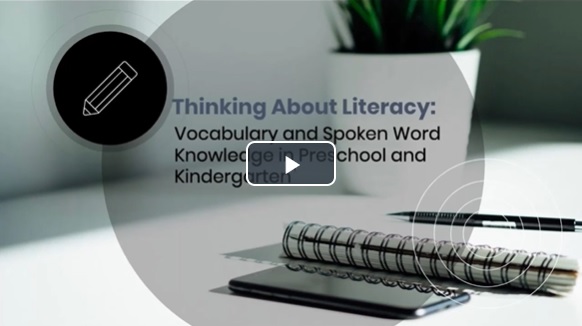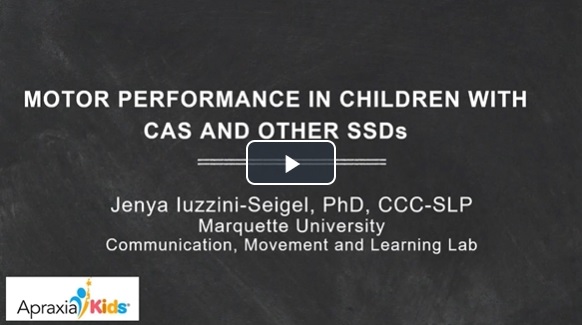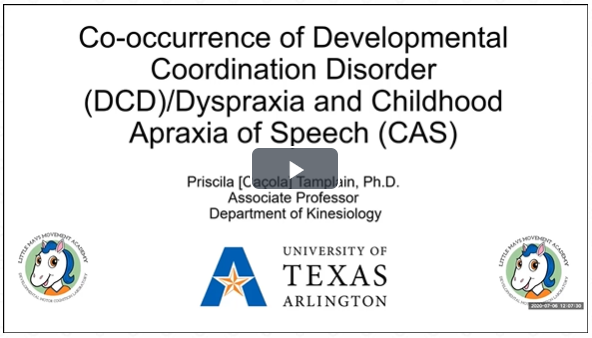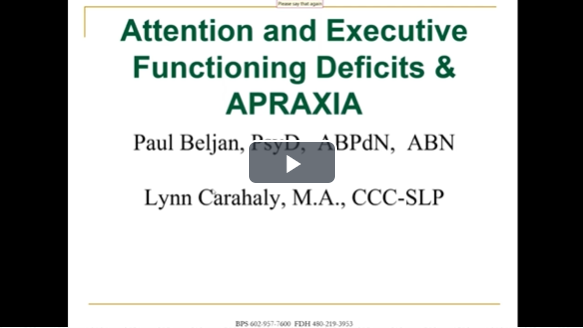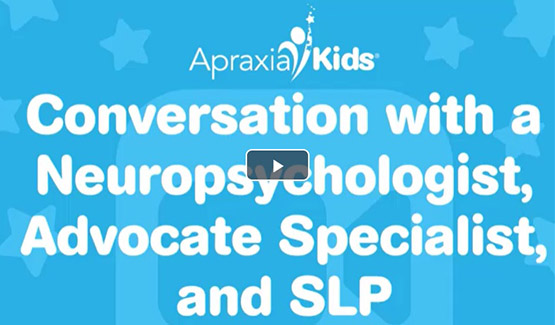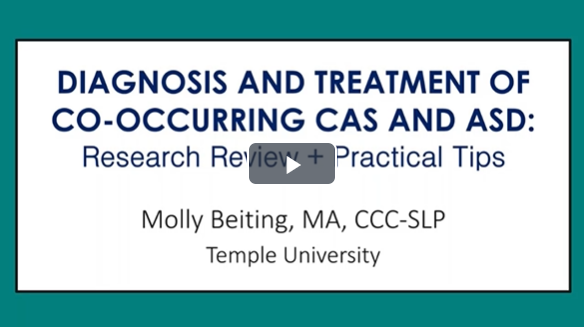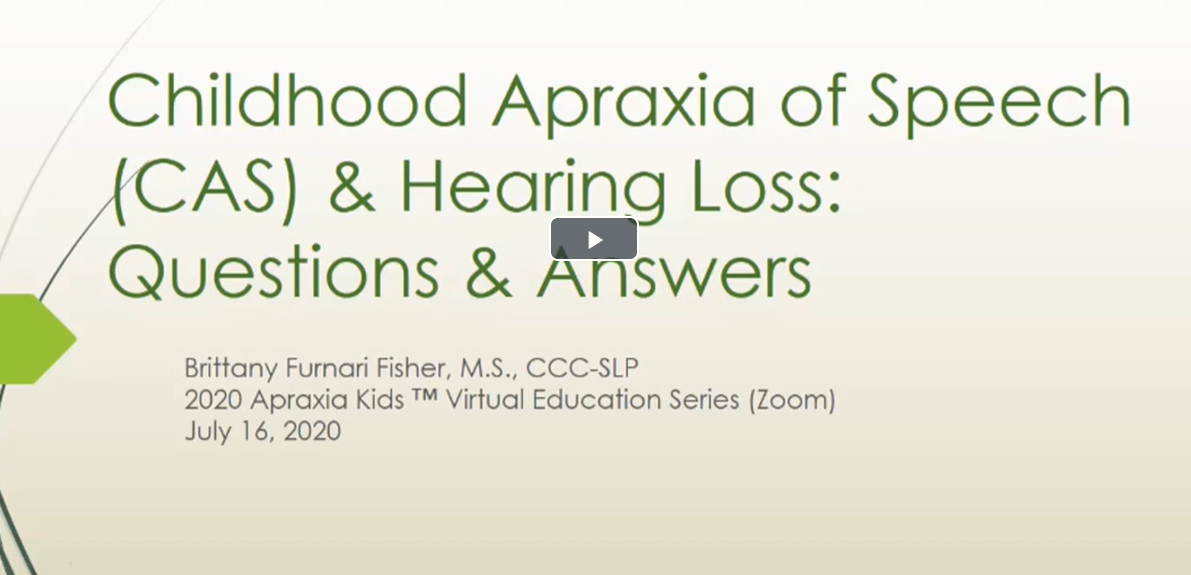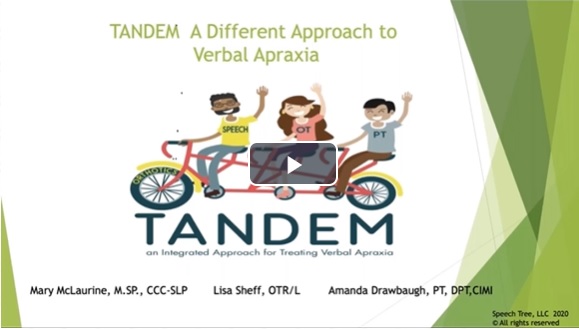Comorbidity
Thinking about Literacy: Vocabulary and Spoken Word Knowledge in Preschool and Kindergarten
Presented by: Lyndsay Bourdeau, MSc.-SLP and Lisa Kohel, R. SLP
Two registered Canadian SLPs will discuss how vocabulary relates to literacy and practical guidelines for choosing appropriate vocabulary for improving word knowledge and articulation for speech sound disorders including CAS.
Download Presentation Handouts Here
Additional Resources
Gross & Fine Motor Skills
Fine and Gross Motor Abilities in Children with CAS
Presented by: Dr. Jenya Iuzzini-Seigel, CCC-SLP
Children with CAS are at increased risk for language impairments and fine and gross motor impairments which can increase academic, social, and even vocational challenges. This session will discuss the details and clinical applications of Dr. Iuzzini-Seigel’s study which compared gross and fine motor skills of children with CAS both with and without comorbid language disorders with children who did not have CAS.
Download Presentation Handouts Here
Co-occurrence of Developmental Coordination Disorder (DCD)/Dyspraxia and Childhood Apraxia of Speech (CAS)
Recorded on Monday, July 6, 2020
Presented by: Dr. Priscila Tamplain, Motor Neuroscience
Developmental Coordination Disorder (DCD) and Childhood Apraxia of Speech (CAS) are both motor disorders that can be explained by impaired planning and execution of voluntary movements. DCD is defined as poor motor proficiency in children. These motor impairments interfere with a wide variety of behaviors and skills, including academic achievement, daily living skills (such as dressing, tying shoelaces, and brushing teeth), and the ability to engage in sport and other motor activities. This session will define and explain DCD as a condition, its consequences and highlight findings from Dr. Tamplain’s preliminary study exploring the co-occurrence of DCD in children diagnosed with CAS.
Download Presentation Handouts Here.
Additional Resources
Learning Disabilities and the Whole Brain
Attention and Executive Functioning Deficits and Apraxia
Presented by: Paul Beljan, PsyD, ABPdN, ABN and Lynn Carahaly, MA, CCC-SLP
This session provides an understanding of the brain basis of attention and executive functioning (EF) and their relationship to language and learning. Participants will be equipped with the ability to generate appropriate interventions for students who also have Attention Deficit Hyperactivity Disorder (ADHD) and Executive Functioning Disorder. This interactive lecture will provide an understanding of all of the components involved in an intact attention and executive function system, enabling caretakers and SLPs to not only determine what is willful behavior and what is not, but to also be able to generate appropriate interventions and expectations of children with ADHD/EFD.
Download Presentation Handouts Here
Additional Resources
Facebook Live Conversation with a Neuropsychologist and SLP
Recorded on July 14, 2020
Presented by: Paul Beljan, PsyD, ABPdN, ABN and Lynn Carahaly, MA, CCC-SLP
What would you ask a clinical psychologist or a SLP about CAS and whole brain functioning? Listen in on a conversation with a SLP who specializes in CAS and a pediatric neuropsychologist as they ask and respond to a few questions.
Learning Disabilities & CAS for SLPS
Tuesday, August 4, 2020
6:00 PM – 7:00 PM EDT
Click here to join the webinar on Zoom.
Please click here to submit a topic related question for these speakers prior to the LIVE event.
A recording of this live webinar will be available on this page.
Presented by: Paul Beljan, PsyD, ABPdN, ABN and Lynn Carahaly, MA, CCC-SLP
Join a pediatric neuropsychologist, a clinical psychologist specializing in school advocacy, and a Speech Language Pathologist specializing in CAS as they discuss and respond to questions from professionals about how learning disabilities and CAS impact the entire child.
Additional Resources
Before you attend this LIVE session, we recommend that you view the 140 minute recorded webinar Attention and Executive Functioning Deficits and Apraxia by Dr. Beljan and Mrs. Carahaly available in THIS (Comorbidity) track.
An additional 70 minute presentation about Advocating for Your Child by Sarah Bald, PsyD
can be found in the Hot Topics track.
Learning Disabilities & CAS for Families
Tuesday, August 4, 2020
7:30 PM – 8:30 PM EDT
Click here to join the webinar on Zoom.
Please click here to submit a topic related question for these speakers prior to the LIVE event.
A recording of this live webinar will be available on this page.
Presented by: Paul Beljan, PsyD, ABPdN, ABN and Lynn Carahaly, MA, CCC-SLP
Join a pediatric neuropsychologist, a clinical psychologist specializing in school advocacy, and a Speech Language Pathologist specializing in CAS as they discuss and respond to questions from family members about how learning disabilities and CAS impact the entire child.
Additional Resources
Before you attend this LIVE session, we recommend that you view the 140 minute recorded webinar Attention and Executive Functioning Deficits and Apraxia by Dr. Beljan and Mrs. Carahaly available in This (Comorbidity) track
An additional 70 minute presentation about Advocating for Your Child by Sarah Bald, PsyD
can be found in the Advocacy track.
CAS and Autism
Practical Tips for Diagnosing and Treating Children with CAS and ASD
Presented by: Molly Beiting, M.A. CCC-SLP, PhD candidate
Join an active researcher for a review of current research followed by practical information for diagnosing and treating children who have Autism Spectrum Disorder and CAS.
Download Presentation Handouts Here
Additional Resources
CAS and Hearing Loss
CAS and Hearing Loss: Q & A
Recorded on July 16, 2020
Presented by: Brittany Furnari, MS, CCC-SLP
How does hearing loss affect speech development in a child with motor speech difficulties? Following a brief lesson, Brittany who specializes in working with children who are deaf/hard of hearing, will discuss and answer questions related to the diagnosis and treatment of CAS in the presence of co-occurring, aided hearing loss.
Download Presentation Handouts here.
Tandem: A Different View of Apraxia
Presented by: Mary McLaurine, M/SP, CCC-SLP, Lisa Sheff OTR/L, and Amanda Drawbaugh, PT, DPT
Children who have apraxia “fix” to move and they select speech muscles to support their gross and fine motor activities including walking, sitting, and playing with toys. This consistent and creative “fixing” disrupts the orderly emergence of speech, language, and oral motor skills. This webinar will briefly discuss the integration of Speech Language Therapy, Occupational Therapy, and Physical Therapy treatment strategies by an experienced OT, PT, and SLP. The participants will begin to recognize “fixing” patterns and learn treatment strategies to break the patterns to encourage the orderly emergence of speech, language, and oral-motor skills.
Download Presentation Handouts Here
Additional Resources



